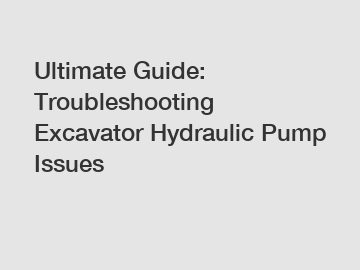Ultimate Guide: Troubleshooting Excavator Hydraulic Pump Issues
Excavators are essential equipment in the construction industry, and their hydraulic pumps play a crucial role in their operation. When these pumps malfunction, it can result in costly downtime and delays in completing projects. In this ultimate guide, we will explore common issues with excavator hydraulic pumps and provide troubleshooting tips to help you get your equipment back up and running smoothly.
Hydraulic pumps are responsible for powering the movement of the excavator's boom, arm, and bucket. When a hydraulic pump fails, it can manifest in various ways, such as reduced power, slow operation, or complete failure to move the hydraulic components. These issues can be caused by a range of factors, including air in the hydraulic system, worn-out components, or contaminated hydraulic fluid.
One common issue that excavator operators encounter is cavitation in the hydraulic pump. Cavitation occurs when air enters the hydraulic system, causing bubbles to form and collapse within the pump. This can result in reduced pump efficiency, increased noise levels, and damage to the pump components. To troubleshoot cavitation, check for leaks in the hydraulic system, ensure that the hydraulic fluid level is correct, and replace the hydraulic filter if it is clogged.

Another common issue with excavator hydraulic pumps is overheating. Overheating can occur due to a lack of sufficient cooling, worn-out components, or high operating temperatures. To troubleshoot overheating, check the hydraulic fluid level and quality, inspect the cooling system for leaks or blockages, and ensure that the pump is not operating at excessively high temperatures. Regular maintenance and servicing of the hydraulic system can help prevent overheating issues.
Worn-out hydraulic components can also cause issues with the excavator hydraulic pump. Over time, the seals, O-rings, and pistons in the pump can degrade, leading to leaks, reduced performance, and potential pump failure. To troubleshoot worn-out components, inspect the pump for any signs of wear or damage, and replace any faulty parts as needed. Regularly inspecting and maintaining the hydraulic pump can help prolong its lifespan and prevent costly repairs.
Contaminated hydraulic fluid is another common issue that can affect the performance of the excavator hydraulic pump. Contaminants such as dirt, debris, or water can enter the hydraulic system, causing damage to the pump components and reducing efficiency. To troubleshoot contaminated hydraulic fluid, check the hydraulic fluid for any signs of contamination, such as cloudiness or abnormal odor. If contamination is present, drain and replace the hydraulic fluid and clean the hydraulic system thoroughly.
In addition to these common issues, excavator hydraulic pumps can also experience electrical problems, such as faulty sensors or wiring issues. If the pump is not responding to commands from the operator or displaying error codes, it could be due to an electrical issue. Troubleshoot electrical problems by checking the wiring connections, sensors, and control panel for any signs of damage or malfunction. Repair or replace any faulty components to restore the pump's functionality.
Overall, troubleshooting excavator hydraulic pump issues requires a combination of technical knowledge, experience, and attention to detail. By understanding the common issues that can affect hydraulic pumps and following the troubleshooting tips outlined in this guide, you can effectively diagnose and resolve problems with your equipment. Regular maintenance and servicing of the hydraulic system are also essential to prevent issues and ensure optimal performance of your excavator. With proper care and maintenance, your excavator hydraulic pump can continue to operate efficiently and reliably, allowing you to complete projects on time and within budget.
If you want to learn more, please visit our website 6bg1 engine services, kubota engine exporter, isuzu 4bg1 engine specifications.

Comments